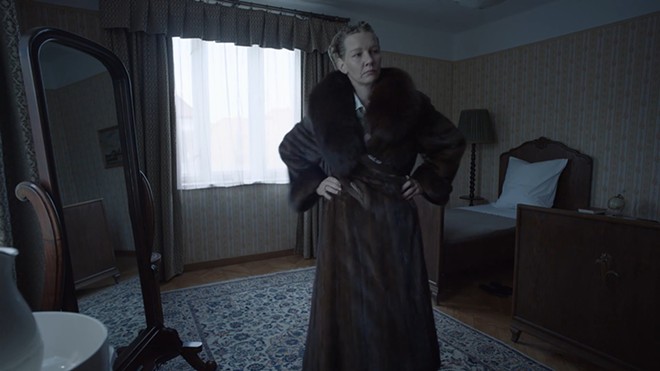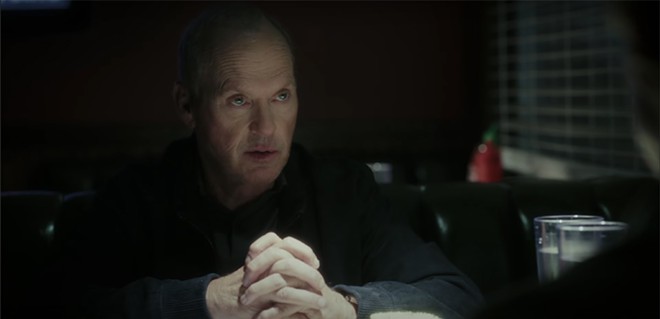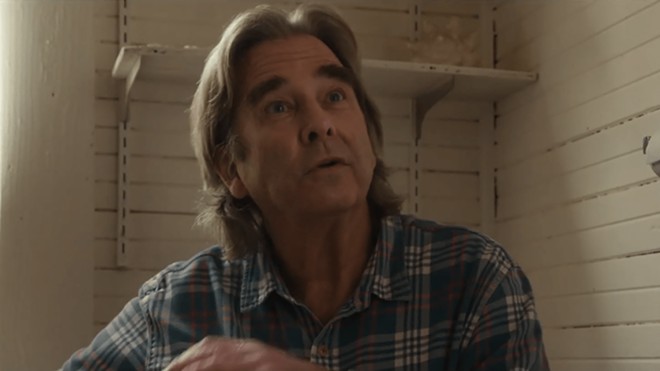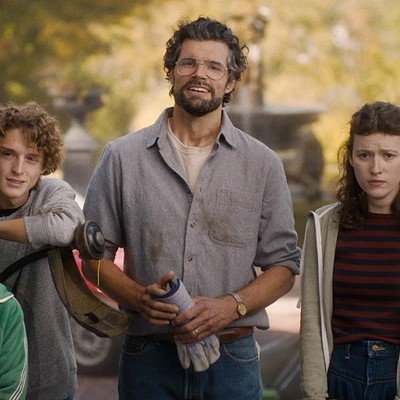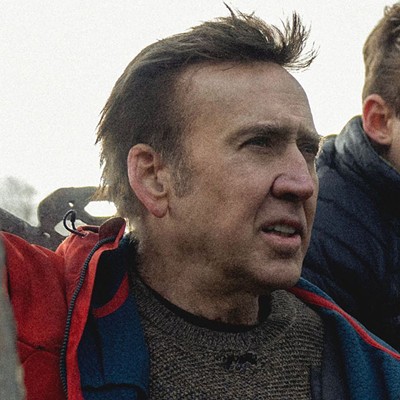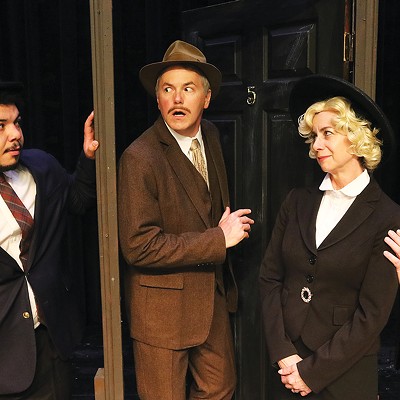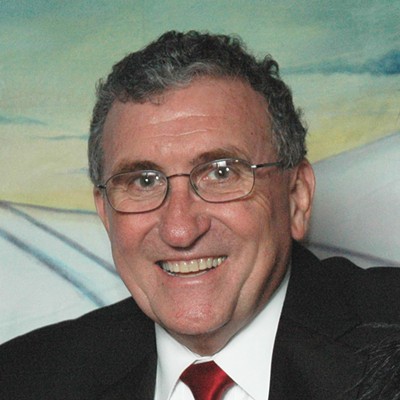Zone a powerful examination of the callousness of evil
The Hoss household is very much like yours and mine. The mother, Hedwig, worries about her children, has to make sure that meals are prepared on time, the garden is tended to and is preparing for a visit from her mother. Her husband, Rudolf, is consumed by his work. While it may be an overstatement to say he's a workaholic, he does get so wrapped up in things that he forgets some family events. He's angling for a promotion at work, one Hedwig desperately hopes he'll get. He's a good husband and father, promising to take his wife back to Italy and a spa she liked and makes time to go rowing and playing with his children. That they are both Nazis and he runs the Auschwitz concentration camp, which can be seen from their backyard beyond a high wall, is simply just another aspect of their lives.
Jonathan Glazer's The Zone of Interest, adapted from the novel by Martin Amis, is a quiet, sobering, audacious piece of work that looks at the Holocaust from a unique perspective. While an occasional scream or a volley of rifle shots is heard now and again, the viewer is not subjected to the atrocities perpetrated on the Jews. Glazer's intent is to examine the evil behind such acts, the callous nature of a society that precipitated one of the greatest tragedies of the 20th century.
The normalcy that has set in with the Hosses regarding these reprehensible actions is, of course, the true horror at the core of the film. The slow creep of intolerance spawns a dogma of acceptance where violence and hate are accepted. And from there, murder and genocide are just small steps on the road to societal damnation. Glazer's restraint brilliantly underscores this, as do Sandra Huller and Christian Friedel's performances as the Hosses'. There are no histrionics in their performances, no obvious affectations that would identify them as villains. They're seen as a couple simply trying to get ahead, wanting to provide the best lives they can for themselves and their children.
And it is their casual nature that is so chilling and, regrettably, so recognizable. We live in a time in which the currency of hate has rarely been higher, fueled by the blindness of those who embrace it. It's being held at bay, barely, yet Zone powerfully reminds us that it takes but a small step before the slaughter of the innocent is considered just so much background noise. In theaters.
With Knox, Keaton excels in front of and behind the camera
Though only directing a film for the second time in his long career, there's a confidence behind Michael Keaton's approach in Knox Goes Away. He's not afraid to challenge the viewer where presenting a complex narrative is concerned, and his willingness to let long stretches play out with little dialogue is refreshing. Perhaps most impressive is his ability to gauge his own performance – a complicated endeavor – as his turn is one of subtle response and gradations as the titular character, a hitman with a checkered past, is quickly losing his mind. Fully aware something is amiss, Knox undergoes a battery of tests that reveals a dire prognosis. It seems he is suffering from Creutzfeldt-Jacob Disease, a degenerative condition that affects the mind, causing personality changes, depression and the loss of memory, usually occurring over the course of a few short months, the afflicted usually slipping into a coma. Knowing he can no longer continue to work, he sets out to complete a previously contracted job. It goes horribly wrong, leaving two innocents dead. Knox seems to effectively cover his tracks, only to have another dilemma fall into his lap. His estranged son, Miles (James Marsden), who hasn't spoken to him in 20 years, shows up on his doorstep bloodied and injured. Knowing his father's line of work, the revelation of which led to his cutting off communication with him, the desperate young man is hoping he can help him get away with murder. Upon visiting a pedophile who impregnated his 16-year-old daughter, he lost his temper and stabbed him to death. If anyone can get him out this jam, it's Knox...or so he thinks. Screenwriter Gregory Poirier holds his narrative cards close to his chest, as he gives the viewer just enough information to stay engaged and nothing more. He keeps us in the dark as to how Knox is going to pull all this off, which is an effective hook, especially when the character seemingly paints himself into a corner or two. We end up questioning whether we are being toyed with along with Knox's targets or if the information that is being withheld is due to his faulty memories.
When described, it sounds like a hoary potboiler, but it doesn't play as such. There's a low-key approach that provides the film with a sense of realism, tempering the sensational elements of the story. Keaton's performance holds it all together, and Knox's humanity takes center stage, with the actor wisely underplaying every moment. Seeing this intelligent man's identity slip away as his memories become so much fodder for the disease that's ravaging him is surprisingly moving, the final scene a relatable, haunting moment, more chilling than anything found in a horror film. In theaters.
Bridges on key in Highway
It would be tempting to say that with The Neon Highway, Beau Bridges is simply following in the footsteps of his brother, Jeff. As his younger sibling did in Crazy Heart, he plays a washed-up country singer who, desperate for a comeback, finds that things in the Nashville music industry have changed radically since he was a star. Like Jeff, Beau plays a pretty good guitar, has a weary, gravelly voice perfectly suited for the genre and is wholly convincing in the role.
However, the script by Phillip Bellury and director William Wages takes Beau's character, Claude Allen, down a different narrative road. Retired, not by choice, his path crosses with that of Wayne Collins (Rob Mayes), a songwriter who gave up his dreams of stardom after a tragic accident involving his brother and musical partner, Lloyd (T. J. Power). However, financial difficulties cause him to reconsider his career choices and he allows Allen to rekindle his hopes. He plays his song Neon Highway for the musician, who recognizes it as a hit upon which he can build a comeback. Agreeing on a 50/50 partnership, they set out to Music City, Allen promising to call in some favors from old friends to get the song recorded and on the airwaves.
The script holds its cards close to its vest as to whether Allen truly wants to help Collins or if he's only looking out for himself. Bridges gives a crafty, cagey performance, charming one minute, not to be trusted the next. The actor employs a sense of charm and vulnerability so effectively, you understand why Collins, who seems rather savvy, could be taken in by him. From one scene to the next, I was uncertain as to Allen's intent, which is precisely the point.
The presence of Lee Brice and Pam Tillis bring validity to the film as does the title song, a keeper that's much better than most of the country/pop littering the airwaves today. Shooting partially in Nashville adds to the realism as do the working-class environs of Collins and his family, their financial troubles all too familiar. All of this rings true, which makes some third-act plot machinations all the more glaring. Still, Neon is a solid, low-budget effort that will resonate with many, especially those longing for a second chance to be heard, as well as viewers steeped in country music lore and the movies that have contributed to it. Available through Video-On-Demand, Amazon Prime.

